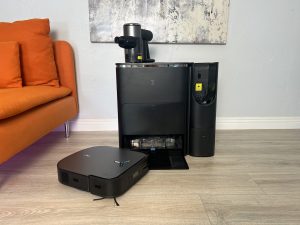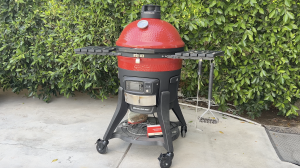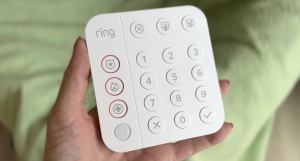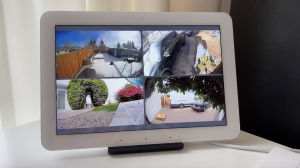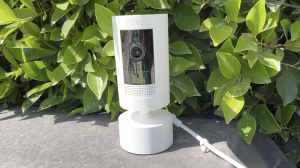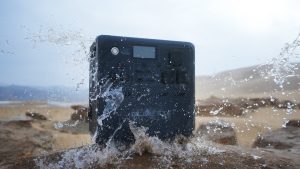
What does a humidifier do?
When I started researching humidifiers I started seeing many of the same questions come up again and again. Let’s start with the most obvious, what does a humidifier do?
A humidifier like the Superior 6000S is a device you fill with water, and it has a fan and often filters or wicks that help more moisture, or water (also called humidity) get into your home.
How do you know if you need a humidifier?
You could use an air quality monitor to tell you exactly what your humidity levels are; ideal humidity is between about 30 and 50%, and some smart thermostats can also display your reading.
If you don’t have a monitor there are a few telltale signs of a dry home:
- Excess static electricity: if you’re getting shocks or giving them or your hair is nothing but flyaways, you may have a dry home.
- Dry, itchy eyes, skin, chapped lips: if you’re using moisturizer and lip balms or moistening eye drops without any relief, dryness may be a problem.
- Coughs or Nosebleeds: in some cases breathing dry air can cause nosebleeds or persistent coughing. Check with a doctor, of course, then investigate better humidity at home.
What are the different types of humidifier?
When it comes to choosing a humidifier there are four types:
- Central humidifier: Part of central home heating or cooling systems.
- Ultrasonic or Impeller (cool mist) humidifiers: These devices use sound waves or a special rotating disc to give off a cool mist. Levoit’s LV600S or Levoit OasisMist 450S Smart Humidifier are examples of this type of humidifier.
- Steam vaporizer: Electricity creates hot steam inside that then cools before leaving the machine. While these can be good, you do need to take care not to spill them as the hot water can cause burns.
- Evaporators: These devices use a fan to blow air through a wet wick, filter or belt. The Superior 6000S is an example of a smart evaporative humidifier.
How do you know what kind of humidifier you need?
Choosing a humidifier is actually quite easy. Instead of hiring a professional installer and adding a humidifier to your home’s heating or cooling system, you can instead choose one that’s all ready to go and needs just a few easy set up steps.
What type of water should be used in a humidifier?

Which is better; cool or warm mist humidifier?
If you have children or pets in the home, a steam vaporizer or warm mist humidifier may not be a good choice for safety reasons. In that case a cool mist or evaporative humidifier may be a better option. ll.
What’s the difference between a humidifier and air purifier?
In a word: water. Air purifiers simply run your air through a filtration system to remove allergens and impurities, while a humidifier’s job is to add water into the air and release that water as either a visible mist or invisible water vapor.
Do I need a humidifier year round?
While it’s common to hear more about humidifier use in the winter, there are benefits to running a humidifier year-round. Particularly if you use air conditioning in the summer, indoor air can be dry, and it may be beneficial to have a humidifier running all year.
Of course if you live in a drier climate, a humidifier may be needed constantly. In this case a larger format evaporative humidifier like Levoit’s Superior 6000S would be an ideal choice for humidifying a whole home without requiring constant fill-ups.
Should I get a humidifier with mist or water vapor?
Even if it’s visible as it exists in the machine, mist will quickly evaporate and become invisible almost immediately. So, whether you can see the water vapor emerging from your humidifier or not, it’s still getting into the air, so both types of humidifier will be helpful.
Where should I place a humidifier?
Generally speaking you can place a humidifier anywhere in your home; many people may use a basement or laundry room area as a convenient location. Wherever you choose to place your device, ensure there is good clearance and circulation all the way around the unit and it’s not pushed into a corner or under a shelf where water could condense. The Superior 6000S is unique in that it is a whole home humidifier – so no matter where it is placed in your house, it can humidify up to 3000 sq ft.
What is the healthiest type of humidifier?
Generally speaking a clean humidifier is a healthy humidifier, so ensure you do regular cleaning and maintenance, no matter which type of humidifier you choose.
Even so, ultrasonic humidifiers may require more maintenance because they typically lack filters that can absorb dust, mold or impurities—that’s why they must be kept clean.
Evaporative humidifiers use a safe, cool mist and employ filters or wicks, which may make them a better choice for allergy sufferers, and those looking for lower maintenance options. They are also better at minimizing mold and build-up.
How do I maintain my humidifier?

Follow the manufacturers recommendations for how often your humidifier should be cleaned, and with what types of cleansers—in some cases this may be as frequently as daily for ultrasonic humidifiers which lack filters.
With my Superior 6000S, Levoit recommends changing the water and cleaning the machine every 3 days, and if it’s not being used, not to leave water sitting in the humidifier.
If you have hard water or lime scale buildup in your humidifier you can use white vinegar, citric acid or a special limescale remover to clean the inside of your unit. If a pinkish or orangey biofilm has developed, or it you feel more cleaning power is needed, use soap and water plus a soft bristled brush.
Ensure all the parts of your humidifier dry thoroughly between cleanings.
Lastly, be sure to replace the filters or wicks regularly, especially if you notice any musty smell or mold growth. The Superior 6000S has an indicator that will light up when it’s time to change the wick filters, and the app will let you know too, taking the guesswork out of replacement.
I’ve been really happy with my Levoit Superior 6000S and can recommend it since it’s a great way to increase the humidity in the home. Don’t forget to check out the full Superior 6000S review here, and visit Levoit’s website for current pricing or promotions. You can also shop Levoit humidifiers and other great home products on Amazon.
Watch my full review of Levoit Superior 6000S
Also Read:
- Aukey Ultrasonic Diffuser & Air Humidifier Review
- Review: Dyson Pure Humidify+Cool fan, purifier & humidifier
**A note about Affiliate Links: TechGadgetsCanada & TechGadgetsInternational is supported by our readers. Occasionally I will include affiliate links in my reviews. I do this partly for convenience of the reader (since I’ll almost always include a link to the company website or similar anyway) in case you want to read more or purchase, but I also may get a small commission from the click, which helps me keep the blog running. If you choose to use this link I thank you greatly for supporting the blog. There’s no obligation or cost to you for using these links. As an Amazon Associate I earn from qualifying purchases.
